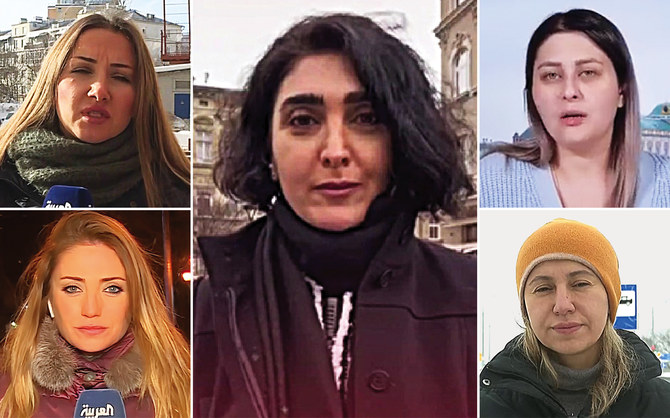
- ARAB NEWS
- 27 Apr 2024

LONDON: When the Russian invasion of Ukraine began almost two weeks ago, Middle Eastern news outlets were quick to respond, deploying correspondents to report live from the ground.
With a particular focus on how the conflict might impact the Arab world, newsrooms in Arab capitals, from Riyadh to Dubai to Doha, have worked round the clock to keep their viewers informed with the latest news and views about the crisis.
However, viewers region wide have noticed something different about the recent coverage: Almost all of the correspondents deployed by regional channels to cover the war are women.
Among the prominent Arab women covering the war is Najlaa Aboumerhi, a war correspondent for Qatar’s regional news channel Al-Araby TV. She has been reporting on the developments as they unfold from the heart of Ukraine.
Previously at BBC Arabic, London-based Aboumerhi’s reporting style has drawn praise for displaying both courage and charisma that resonated well with Arab audiences.
“Reporting from a hostile environment needs some journalistic qualifications and personal aptitude and skills that I believe I enjoy, therefore when I was asked to be deployed to Ukraine, Kyiv by my editors at Al-Araby TV, I immediately accepted the mission,” Aboumerhi told Arab News.
A mentor in the Marie Colvin Female Journalists’ Network, which is dedicated to the late American correspondent who was killed while reporting on the Syrian war for London’s Sunday Times newspaper, Aboumerhi described women’s experiences on the front line.
“I think we see more women reporters on the front line due to many factors, not because women were less keen before, but because at the decision-making level, the thinking has changed,” she said.
“In the last ten years, we witnessed a move that pushed for more diversity in general, that led to giving the platform for more women contributors, more presenters, allowing the natural progress for women to reach a high level of seniority and to actually be able to lead.”
Another woman covering the war is Al-Hadath’s Christiane Baissary, who recently tracked Russian troop movements as they entered Kharkiv in northeast Ukraine live from the front line. Footage shows Baissary and her team being asked to take shelter and move somewhere safer.
“In the last ten years, we witnessed a move that pushed for more diversity in general, that led to giving the platform for more women contributors, more presenters, allowing the natural progress for women to reach a high level of seniority and to actually be able to lead.”
Another woman covering the war is Al-Hadath’s Christiane Baissary, who recently tracked Russian troop movements as they entered Kharkiv in northeast Ukraine live from the front line. Footage shows Baissary and her team being asked to take shelter and move somewhere safer.
These women follow a long line of embedded female correspondents who have reported from conflict zones.
Al-Arabiya’s Iraqi journalist Atwar Bahjat lost her life reporting on the US invasion of Iraq. In 2006, she was hunted down and shot in cold blood, along with her colleagues Adnan Al-Dulaimi and Khalid Al-Fellahi, while covering a story in Samarra.
Other well-known conflict correspondents are Al Arabiya’s Rima Maktabi and Najwa Qassem, who both covered the 2006 Lebanon war, with the former being named among the world’s 100 most influential journalists covering armed violence in a ranking by a UK-based charity.